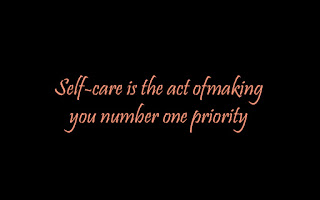Attain Emotional Balance & How to Achieve Self-Fulfillment
These days, self-care is a big button issue for everyone. Everyone is seeking emotional health and fulfillment, but don't know how to achieve it. Ask
yourself, how often do you take care of others over yourself? To be strong for
others, you have to take care of yourself first.
If you don’t take responsibility for yourself, then no one else will; then nothing in yourself or life will change. If you don't take of yourself first, then you can't take care of another person. Think of being on an airplane and the oxygen masks drop down. What is the procedure? You put your mask on first before someone else. If if you do it for the other person, you run out of oxygen quickly and you both perish.
So the first thing you do to move into emotional health and embrace self-fulfillment is to take care of yourself. Self-care means paying attention to your thoughts, emotions,
and physical sensations now. You do that by cleaning up unresolved situations long ignored. It
is giving care and attention to yourself.
Personal health, confidence, and fulfillment come from processing what
was not before, rather than just gaining personal insight.
3 Steps to Emotional Balance & Achieving Self-fulfillment
3 Steps to Emotional Balance & Achieving Self-fulfillment
Below are specific ways to seek emotional health and fulfillment. Follow the methods below to help you with processing present
issues, as well as past material that you might not have ever dealt with.
1. Intuitive Approach.
First, to enter into processing from an intuitiveness mindset
approach, where you can't be in your thoughts or feelings. Both your thinking and feeling will betray you and suck you into reliving.
Second, successful processing has to come from your second brain, which, if you don't, is your gut. Your gut is a place of "sensing" and is void of thinking and feeling. That is why processing can be so helpful.
Third, in order to process what you need to, you have to "step back" from yourself (divorcing yourself from the drama of the memory, false emotions, and distorted thinking) and witness the content of what happened, what you experienced, and all the drama connected.
Intuitive processing is the practice of digesting past pain from gut instinct or sensing actually guttural
observing your thoughts, emotions, and physical sensations from a witness
position instead of being involved as a participant. The difference between "I feel right now I
am hurting" (Caught up in or re-experiencing) and "My heart is hurt
due to..." (Sensing the process). "I feel like a victim,"
"I sense I was a victim."; “I feel not good enough,” “I was labeled
as not good enough.”
Therapy is not processing. The therapeutic approach is the practice of immersing into the thoughts, emotions, and physical sensations to
gain self-insight but can quickly result in surfacing triggers and realistic
reexperiencing activating the fight or flight mechanism. Therapy is not
processing.
Second, successful processing has to come from your second brain, which, if you don't, is your gut. Your gut is a place of "sensing" and is void of thinking and feeling. That is why processing can be so helpful.
Third, in order to process what you need to, you have to "step back" from yourself (divorcing yourself from the drama of the memory, false emotions, and distorted thinking) and witness the content of what happened, what you experienced, and all the drama connected.
If you can accomplish 1 through 3, you are ready for an intuitive approach.
Now, in my opinion, therapy is not processing. The therapeutic approach is the practice of immersing into the thoughts, emotions, and physical sensations of the client to
gain self-insight. Therapy can quickly result in surfacing triggers and realistic
re-experiencing which can activate the fight or flight mechanism. Therapy is not
processing.
2. Recognize what you have not processed yet.
Be honest and authentic with yourself. Recognizing is not a platform for judgment or criticism.
3. Don't get caught up in the residual drama of the issue
you need to process.
Now is now. Now is not yesterday, nor is it the
future.
4. Don't hide or act out
The first instinct is to hide, run from, or fight the thoughts, emotions, and physical sensations or onslaught of triggers. If you are
in a witness stance, the fight or flight mechanism will not activate.
5. Do not stop
Keep chewing to allow the digestion (processing ) to reach
the desired mission, going out of your body and mind. For people who are not able
to digest (process life situations) the symbolic result is that the body either
holds on to the poop (constipation - can't get rid of it or get it out, causing
a high level of constriction or restriction) or diarrhea (can't control or hold
poop). Neither constipation nor diarrhea is healthy for digestion (emotional processing or self-fulfillment).
6. Take action
Change how you label yourself. Don't engage in
self-criticism, self-judgment, self-rejection, or self-victimization.
Instead, support yourself by loving yourself, encouraging yourself, and having compassion for yourself.
You should always be your number one priority.
Coach Bill
You should always be your number one priority.
Coach Bill



Comments
Post a Comment